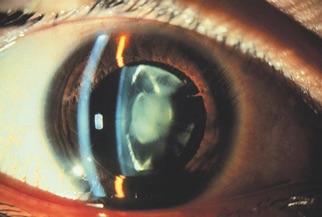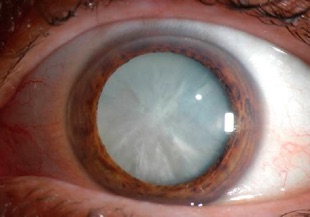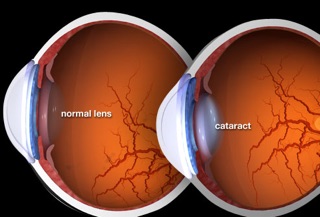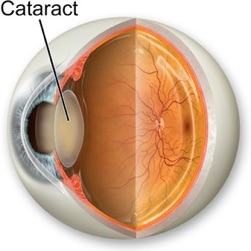Stoppen met roken
Uit het Zweedse onderzoek blijkt dat de kans op het krijgen van staar sterk afneemt als rokers stoppen met roken. De wetenschappers bestudeerden een groep Zweedse mannen met een leeftijd tussen de 45 en 79 jaar.
Ze onderzochten het verband tussen stoppen met roken en meer dan 5700 gevallen van cataract in de loop van 12 jaar. Zo ontdekten ze dat de kans op het ontwikkelen van cataract afnam als ze stopten met roken.
"Stoppen met roken vermindert het risico op cataract, maar het risico bij voormalig rokers blijft voor decennia hoger dan bij mensen die nooit rookten.", aldus een van de onderzoekers van Orebro University Hospital. Omdat roken ook gerelateerd is aan andere (oog)ziekten pleiten de wetenschappers ervoor om mensen te motiveren om te stoppen met roken.
De resultaten van het onderzoek zijn gepubliceerd in de onlie editie van JAMA Ophthalmology.



Roken veroorzaakt cataract ( staar )
Roken verhoogt de kans op het krijgen van de oogziekte staar. Rokers die stoppen met roken verkleinen de kans op het krijgen van de oogziekte aanzienlijk. Dat blijkt uit nieuw Zweeds onderzoek.
Staar, ook wel cataract genoemd, is een veelvoorkomende aandoening. Bij de aandoening vertroebelt de ooglens. Het ontstaat doordat de heldere en doorzichtige ooglens minder helder wordt. Deze zit voor in het oog, vlak achter de pupil. Door staar ga je waziger zien. Ook zie je alles grauwer van kleur.
Smoking Associated With Cataract Risk
Norra MacReadyJanuary 06, 2014
Smoking cessation has been associated with a steady decrease in risk for cataracts, but even 2 decades after quitting, that risk is still higher than in those who have never smoked, according to a new study. This new analysis supports a growing body of literature that shows a relationship between smoking and the risk for cataracts.
In an analysis of Swedish men, lead author Birgitta Ejdervik Lindblad, MD, PhD, from the Department of Ophthalmology, Örebro University Hospital; the School of Health and Medical Sciences, Örebro University; and the Institute of Environmental Medicine, Karolinska Institutet, Stockholm, Sweden, and colleagues found a significant dose–response relationship between smoking and the need for cataract extraction. Conversely, smoking cessation was associated with a decrease in risk that accumulated over time.
These findings "add to numerous previous epidemiologic studies on the association between smoking and cataract," the authors write. "Although the relative risk estimates vary, most studies have reported a positive association between smoking and cataract." The study was published online January 2, 2014, in JAMA Ophthalmology.
The data come from the Cohort of Swedish Men, a large, prospective cohort study begun in 1997 to examine the association between lifestyle and chronic diseases such as cataracts. Questionnaires were sent to all Swedish men between the ages of 45 and 79 years living in 2 counties in central Sweden; responses were received from 48,645 (48.5%) of them. Dr. Lindblad and coauthors followed-up the men until the date of cataract extraction, death, or the end of follow-up on December 31, 2009.
The study included a total of 44,371 men, of whom 24.9% were current smokers, 38.8% were past smokers, and 36.3% were never smokers when follow-up began in 1998. The mean number of cigarettes smoked daily was 13.9 (standard deviation [SD], 6.3) among current smokers and 13.6 (SD, 6.6) among past smokers.
During 12 years of follow-up, 5713 cases of age-related cataract extraction occurred. On age-adjusted analysis, past or current smoking was associated with a relative risk for cataract extraction of 1.21 (95% confidence interval [CI], 1.15 - 1.28), or a 21% increase in the risk for cataract extraction compared with never smoking. In a multivariate analysis adjusted for diabetes mellitus, hypertension, corticosteroid medication, alcohol consumption, use of vitamin supplements, body mass index, and educational level, ever smoking was associated with a relative risk of 1.18 (95% CI, 1.12 - 1.25) for cataract extraction compared with never smoking.
The authors also observed a relationship between smoking intensity and cataract risk compared with never smoking, ranging on age-adjusted analysis from 1.11 (95% CI, 0.99 - 1.23) with 1 to 5 cigarettes per day to 1.40 (95% CI, 1.30 - 1.51) with more than 15 cigarettes per day (P < .001 for trend) for ever smokers. On multivariate analysis, the relative risk was 1.11 (95% CI, 1.00 - 1.24) with 1 to 5 cigarettes per day and 1.35 (95% CI, 1.25 - 1.46) with more than 15 cigarettes per day (P < .001 for trend). Men who currently smoked more than 15 cigarettes per day had the highest relative risk, at 1.42 (95% CI, 1.28 - 1.58), compared with never smokers.
Smoking cessation was associated with a steadily decreasing risk for cataract extraction. Smokers who had quit less than 10 years before had a relative risk of 1.32 (95% CI, 1.19 - 1.46) on the age-adjusted analysis and 1.27 (95% CI, 1.15 - 1.41) on the multivariate analysis. At 10 to 20 years after quitting, the relative risks were 1.25 (95% CI, 1.16 - 1.36) and 1.22 (95% CI, 1.12 - 1.32), respectively, and at more than 20 years, the relative risks were 1.14 (95% CI, 1.06 - 1.23) and 1.13 (95% CI, 1.04 - 1.22), respectively (P < .001 for trend).
Study limitations include lack of information on cataract type, reliance on retrospective recall to estimate lifetime cigarette smoking, and no data on sunlight exposure, which also can influence cataract risk, the authors write. , "Since smoking is also related to other ocular diseases, strategies to prevent smoking and promote smoking cessation are important, and eye care professionals should encourage people to stop smoking," the authors conclude.
These findings confirm what researchers have known for more than a decade: Smoking contributes to cataract development, said Kevin Miller, MD, professor of clinical ophthalmology at the Jules Stein Eye Institute, David Geffen School of Medicine, University of California, Los Angeles. He cited research dating back to 2000 showing an association between smoking and cataracts, saying, "if you stop smoking you don't lower your risk, but you stop accumulating risk."
Dr. Miller told Medscape Medical News, "I don't think this information is going to change any smoker into a nonsmoker. If the thought of getting lung cancer, bladder cancer, esophageal cancer, chronic obstructive pulmonary disease, strokes, or heart attacks doesn't throw you off smoking, the idea of getting cataracts probably won't do it either."
The answer most likely lies in prevention, he said. "Keeping people off cigarettes is where it needs to be."
The authors and Dr. Miller have disclosed no relevant financial relationships.
JAMA Ophthalmol. Published online January 2, 2014. Abstract
Medscape Medical News © 2014 WebMD, LLC
Send comments and news tips to news@medscape.net.
Cite this article: Smoking Associated With Cataract Risk. Medscape. Jan 06, 2014.
JAMA Ophthalmol. Published online January 2, 2014
De Lairessestraat 59 1071 NT Amsterdam 020-679 71 55 omca@me.com www.omca.nl






Amsterdam Eye Hospital
Oogziekenhuis Amsterdam


